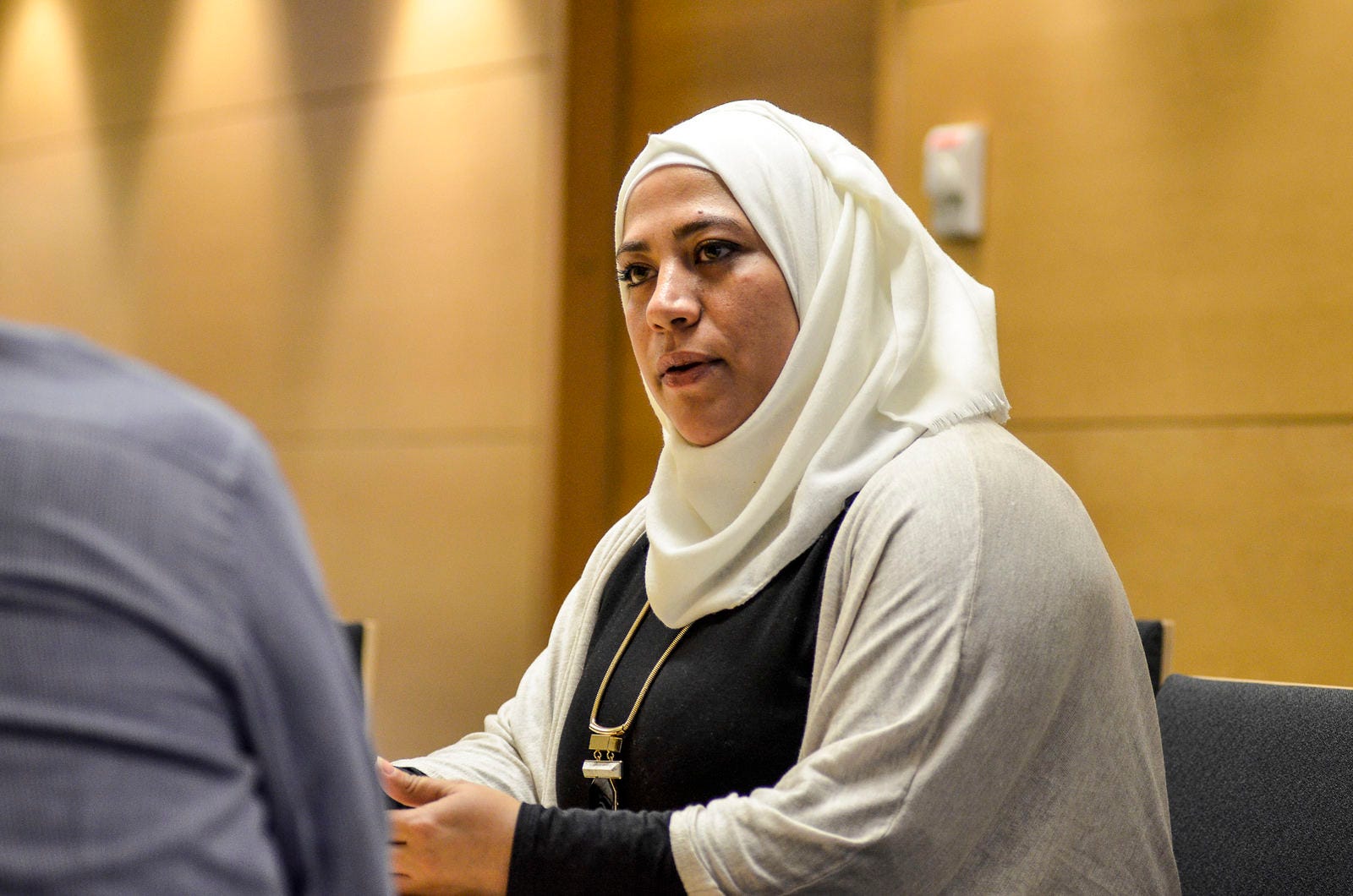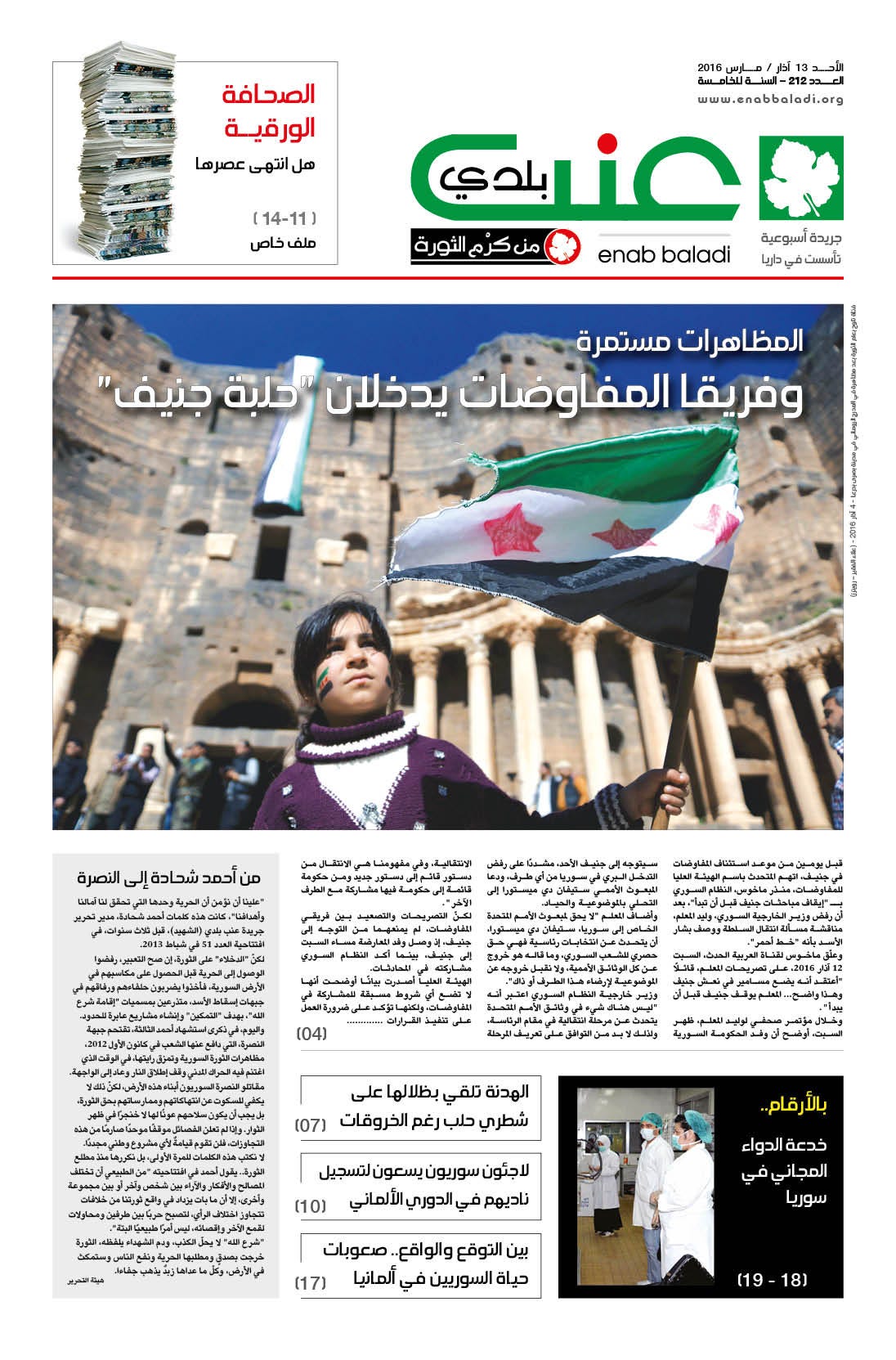Loading...
Title : Revolutionary women: Makers of the new media in Syria
link : Revolutionary women: Makers of the new media in Syria
Revolutionary women: Makers of the new media in Syria

'My name is Kholoud Helmi. I am an activist and a journalist. I began my activism at the very beginning of the Syrian Revolution in 2011. At the end of that same year a group of friends and I realised that there was no media coverage of the situation on the ground in Syria. I come from Darayya, a city about 20 minutes’ drive south west of Damascus by car. We were part of the revolution very early on, going out onto the streets and marching in the earliest wide scale demonstration on the 15th March 2011. Shortly afterwards, in April 2011 government checkpoints started appearing and the regime began besieging my city. There were barriers regulating our entry and exit.
Likewise, there were no international media organisations in Syria to report on what was happening, [as they were] prevented by the regime, and the state-owned media only reported the regime’s point of view, so we took the decision to start our own platform in order to provide an opposing perspective. We were eyewitnesses to what was happening, both eyewitnesses and actors on the ground. Thinking back to the end of 2011 when we made that decision, it was the craziest decision we could have ever made, but certainly the right one.
At that time, the danger we were in — being surrounded by the regime and government security forces — meant that my family couldn’t know that I was working as a journalist. Only very few people knew and as we couldn’t meet in person due to restrictions on our movements and the danger we were putting ourselves in by meeting, we had to use Skype. We used it to plan our actions, organize the layout of the newspaper and discuss what news to cover.
It was crucial for me to focus on being an active woman in the revolution. Of the 25 co-founders of the newspaper, around 75% were women. It was our choice to be part of the newspaper as we had been present for every single moment since the revolution’s beginning. We were taking to the streets and organising demonstrations. We were not just witnessing but participating in everything that was happening.
Women specifically were very important to the resistance movement because until 2012 we were able to pass unrestricted through checkpoints, the regime agents would not search women. Our male colleagues were not able to cross through checkpoints at all, so most of them had to walk for three hours to get from where they lived to Damascus, walking through rural areas to avoid the checkpoints so as not to be scrutinized and arrested by default.
Thus, as women we had greater freedom of movement than our male colleagues and so were better able to take up the mission to go to other towns and cities in order to document the massacres, brutal repression of the demonstrations and other events of the revolution.
We physically printed all our material from the very first edition and began distributing copies in the streets, not just to our friends and acquaintances but to the wider Syrian people. I used to cross checkpoints carrying around one hundred copies in my bag. I knew full well that I could have ended up disappeared, in prison or dead had they even opened my bag. I was stopped by the security forces several times and I knew I was standing between life and death. We had to be so brave, pretending we were doing nothing unusual, that we were just ordinary people going about our daily lives just trying to cross the street. When I think of those moments even now my heart beats faster. I still remember pretending that I was only carrying ‘feminine items’ so they wouldn’t search me.
I was also stopped at mobile checkpoints — checks that would randomly happen out of the blue with no warning and no way to plan for them. They once searched my handbag but stopped just short of looking inside the plastic bag I was carrying with 15 copies of our paper. I had to risk my life many times to circulate our magazine, Enab Baladi.
In January 2013 my hometown fell to the regime. Until this point it had been constantly besieged, with my friends and family having been forced out of homes the previous November. Despite that, my friends and I kept going to back to Darayya taking the rural routes.
In the second week of January as we were leaving the town, one of my friends was captured by the regime. She was married with three children. A week later, the regime arrested her mother, forcing her to entrap us. She called us, her daughter’s friends, saying that she wanted to see us and of course we rushed to her — she had lost her daughter and we wanted to comfort her. The first two women to arrive at her house were immediately arrested by the regime. Luckily a third friend of mine called them to asked where they were and heard them say the phrase we had agreed on should we ever find ourselves in danger: Akhlas, khalast, I’m over, things are over, I’m done. We knew then that the threat to our lives was too great and we had to leave.
One week later we were smuggled to Beirut where we started our new life as part of the Syrian diaspora. First to Lebanon — Beirut, then Egypt and finally Turkey. I ended up in Turkey where the team of Enab Baladi were reunited. We started operating again from Turkey and continue to do so to this day.
We still cover news from all over Syria and have reporters working all over the country. We used to have reporters even in regime-held areas — most of them are women. We even had a reporter in an ISIS occupied area. Our reporter in Damascus quit some time ago because she was feeling the pressure of operating from there and couldn’t take the risk anymore. She felt like she was constantly under scrutiny and being controlled by the regime. We lost a lot of friends on this journey.
One of the co-founders and the first to structure the newspaper took the decision to stay in Darayya after it was besieged by the regime. He was the first one to die, we lost him at the end of 2012. A few months later, we lost the managing editor, he was hit by a missile. Later we lost a third friend, our reporter in Darayya who was also hit by a missile. Four of our guys were then arrested by the regime. We heard three months ago that Nadi, one of the four, was killed under torture in a regime detention centre. My brother and one of the co-founders of the newspaper were taken from their homes in May 2012. There was only one week, during August 2012, that Enab Baladi was not published, when the first massacre committed by the Assad regime in Darayya took place.
Regime forces raided my hometown, slaughtering over a thousand people in three days. Some of our team stayed in Darayya at the time but I had left the town for three days. When I returned it was unrecognisable, horrible. That week we couldn’t report anything. I still remember crying. I had been writing the news of other massacres committed elsewhere but when it happened in my hometown I felt too weak to write about it.
The next week we made the decision to continue. We had to continue spreading the message that a change must come, everybody has to know what is happening in Syria. After seven years we continue to publish Enab Baladi. We have kept the same structure, we have an editor-in-chief, a managing editor, a full team operating. At first our office was very small but we have now moved into larger premises.
Our team has grown in number and now we have reporters based in many cities. We also have reporters from other countries writing about Syrian refugees and are lucky enough to be considered one of the most prominent Syrian platforms. More than six years ago a group of women decided to join the forces of the revolution. We took the streets and had to struggle to be respected but in the end we proved ourselves and here we are now, as founders of something that had never existed before.'

Thus Article Revolutionary women: Makers of the new media in Syria
That's an article Revolutionary women: Makers of the new media in Syria This time, hopefully can give benefits to all of you. well, see you in posting other articles.
You are now reading the article Revolutionary women: Makers of the new media in Syria with the link address https://wordcomes.blogspot.com/2018/02/revolutionary-women-makers-of-new-media.html
0 Response to "Revolutionary women: Makers of the new media in Syria"
Post a Comment